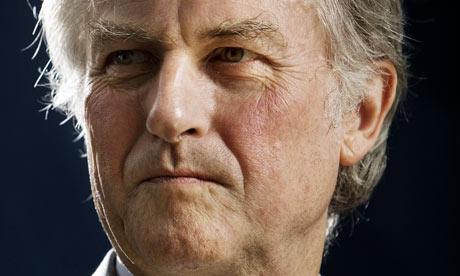Arrogant Atheism
The February issue of the periodical Vigilia featured four authors' articles on The God Delusion by 70-year-old Richard Dawkins infamous for his radical atheism. The four authors are Fr. Ferenc Patsch professor of philosophy at Sapientia University, Tamás Hankovszky and Balázs Mezei of PPCU's Department of Philosophy as well as László Bernáth a student of PPCU, majoring in philosophy. Balázs Mezei and Ferenc Patsch reviewed all of Dawkins' work in general, whereas László Bernáth and Tamás Hankovszky focused on the author's central arguments.1
The topic is both delicate and interesting enough to fill a medium-sized auditorium. There was a full-house on March 21 at Párbeszéd Háza, where a roundtable discussion on Dawkins and this thematic issue of Vigilia took place. It was strange to realise that this crowd is made up of the grannies of Sunday masses, sisters and fathers, naive prigs, as well as monomaniac antitheists, all in the same room at the same time. The first row was reserved for the disabled members of the audience and there was also an interpreter for the audially impaired.2 Moderated by Attila Puskás, Hankovszky, Mezei, Patsch, and in a way representing natural sciences, Csaba Pléh took part in the conversation. Looking at the matters to be discussed, nobody expected this to be a short evening.

First, familiar with Dawkins' work in natural sciences, Csaba Pléh introduced the author, beginning with his theory that organisms are only 'shells' of genes which are the primary beings in this perspective (see Dawkins' The Selfish Gene). Then, Pléh discussed the author's denial of the teleology of evolution (The Blind Watchmaker), and closed by briefly presenting the then longer discussed topic, the meme theory, that is, the idea of 'cultural genes'.
Dawkins' vehement personality was discussed next through funny stories in regards to his arrogance. Here, Balázs Mezei described the traditions of British atheism. Bertrand Russell was one of its first representatives, a position later taken by Antony Flew (converted a couple of years ago and passed away recently) and held by Dawkins today. Mezei pointed out the superficiality of Dawkins' anti-religion works which does not apply to his strictly academic works. According to Mezei, this is his way of showing that the other party does not deserve an equal treatment. Later on, Csaba Pléh said that Dawkins' job at the Professorship for the Public Understanding of Science is to provocatively influence people's world views – "that's what they mean by public understanding of science over there."
It almost seemed like the introduction had turned into a series of personal remarks when Patsch mentioned Dawkins' numerous marriages but the audience soon realised how seriously he meant his own comment when he wittingly added that there was a fragment by Wittgenstein according to which if a christian disagrees with someone, they proclaim them foolish or immoral – and he wanted to avoid that. Thus, however excessively Dawkins denounces religion, there was no 'counter-denouncing', only obliquely, in minor remarks such as the one also from Patsch, saying that withholding the positives of the opponent would make them "sink to the opponent's level". But this is hardly 'denouncing'.

The conversation offered a chance to discuss two theories of Dawkins in detail. First, that God is a redundant scientific hypothesis. After theologist Attila Puskás read quotes in regards to this idea, Ferenc Patsch almost immediately agreed that the God-hypothesis is in fact a redundant scientific hypothesis – and really, believers don't think of God like that. And the participants all agreed that the subject of God is beyond natural sciences. Quoting Balázs Mezei's bon mot, Patsch reminds of "Heidegger and other mysticists" when he considers God "something completely different". Mezei added that Dawkins also presents a concept of God he calls "Einsteinian". This concept is in opposition to the belief in God's transcendental and personal quality – according to Dawkins. God exists in the world and its structure and this is acceptable for the author of The God Delusion.5 If Patsch wanted to deny the existence of God (or rather 'a god') like that, he should probably switch his role of 'apologist' with that of Dawkins.
In regards to Dawkins' statement according to which not only is the God-hypothesis redundant but it's also false, let me discuss Tamás Hankovszky's counterobjection here. He believes, Dawkins took an unwarranted (logical) step when he related a characteristic of worldly designers (namely that they are more complex that their designs) to God. Why wouldn't God design in a completely different manner? (Let me also add that Christianity primarily regards God a creator instead of a designer – an attribute no worldly designer can take.) When Dawkins excludes the possibility of a different kind of 'designing', he presumes in advance what he wants to prove with his 'undeniable argument', that there aren't any 'other' entities beyond those of nature. The key word in Hankovszky's analysis is "extrapolation" which he used to argue that Dawkins expands the facts of evolutionary biology to a territory beyond it, that is, the domain of transcendence.6 As cited form the book, Dawkins states that if God existed, he should've been the result of a long evolutionary process.7

For numerous reasons, a roundtable discussion is not an ideal way to thoroughly discuss a topic. There can be many pitfalls: if disagreements stay latent8, if disregarding the actual questions raised, if participants are too busy presenting their own preconceptions, or if the moderator and the participants aren't able to form a real dialogue. The latter phenomenon is almost always present at an event like this, as many topics are brought forward but a number of them stay undiscussed as the participants don't react to all of them. You could rightfully mention that opposing opinions (Dawkins' atheistic views that is) didn't have an advocator, but one of the main advantages of this conversation was that it avoided the negative features so typical of similar occasions. Moreover, the participants took certain ideas of Dawkins (eg. anti-creationism and religious anti-fundamentalism) under their protection.
The comments of the audience showed a different image however. You'd expect questions but you hear monologues most of the time. Still, the nods and learned answers given to the 'questions' raised makes me think that I was too strict when I expected the audience members' contributions to be brief, well-formed and original. Anyhow, it was interesting to hear that Dawkins presents even atheistic arguments (different from his) superficially.
Speaking the language of football, you could say that this conversation was an 'all-out-attack' as far as it was possible given the time limits of the event. Participants both stated that as opposed to Dawkins' ideas, the God-hypothesis is not necessarily erroneous and they also rejected that God (or the notion of God) is a scientific hypothesis at all. If someone, being an atheist, didn't attend the event in complete denial, they could find several examples that Christianity can present itself in a rational, genuine way - and perhaps it even has some truths. A christian attendee on the other hand could witness a positive example of the honest reckoning of faith.9 "Thinking is good for you" – Balázs Mezei referred to this kind of self-investigation often based on atheistic assaults.
1 The articles can be downloaded here.
2 Although I don't understand the gestures, I noticed that the interpreter often pointed at his head – meaning either philosophy, theory or maybe the pointlessnes of some thoughts.
3 To me, this means that not only are genes more essential than an organism but in case of humans, memes are often superiour to individuals.
4 In 2008, Dawkins retired from the Professorship which was founded by Charles Simonyi, declaring that Dawkins be the department's first head.
5 The Einsteinian approach obviously suggests pantheism but the overusage of the latter label makes the use of the former more effective. Incidentally, many specifically atheist authors accept this view.
6 Naturally, this domain doesn't exist in Dawkins' mind but to prove it, he would probably make tha same mistake of petitio principii, as presented by Hankovszky.
7 There seems to be some irony in Dawkins' words though.
8 To mention here: the title of the February issue of Vigilia and the conversation ("Today's Debates on God"), makes the word 'debate' seem rather symbolic, since the real topic was Dawkins' The God Delusion, and the periodical included only studies by catholic authors on the atheism of Dawkins.
9 At one point Ferenc Patsch said: "when we criticise him so much, I always feel I should stand up for him." He also said that when he put on the chasuble, he always felt the 'guilty tradition' and the 'historic burden', for which it is his job to atone and which he has to "wash off" the church and faith.



Facebook-hozzászólások